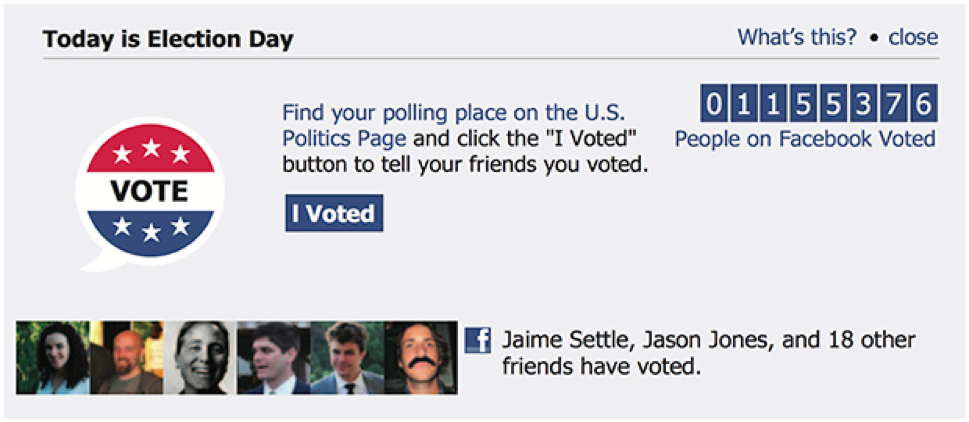By Alex N. Samaei
In November 2010, a study found that Facebook users who were notified that their friends had recently voted were 0.39% more likely to go vote themselves. This increase resulted in approximately 340,000 additional votes than were originally predicted. For perspective, President Bush won the state of Florida by only 537 votes in 2000, clinching the election. Since then social media has become increasingly intertwined in our lives.
What if today Mark Zuckerberg wanted to specifically encourage users who are statistically more likely to vote for a particular candidate to go out and vote? It wouldn’t be too difficult for the tech company to figure this out based on data they obtain through likes, posts, and other demographics users freely sign away. Currently, there are no regulations against internet companies taking these actions. One of the only real factors stopping them is the risk of public backlash effecting stock prices.
The reason this differs from choosing to advertise more heavily in Massachusetts as opposed to Texas, for example, is that you’re targeting specific voters in areas that may become tie-breakers. Both will help get a higher voter turnout in an area, but Facebook is more likely to influence the election. In recent weeks, Facebook increasingly became more involved in the political process with Zuckerberg openly endorsing one candidate and the website launching a feature for users to endorse specific candidates more publicly than ever before. This raises the question of what typical citizens can do to legally challenge this potential issue of political bias.
In order to bring a charge against a defendant in federal courts, a plaintiff needs to be able to prove proper standing. This is the requirement that a plaintiff show they are the proper party to bring a matter to the court. Usually this requires injury in fact, causation, and redressability in the claim.
In this case, injury in fact would require a plaintiff to present that they personally suffered injury or, if they seek injunctive relief, a likelihood of future harm. It would be challenging for a Facebook user to say they suffered a personal injury by not being reminded that their friends had voted. There may be an argument for discrimination based on political party, but currently there are no federal laws prohibiting private companies from selectively reminding certain consumers; only some federal and state laws which pertain to political discrimination against employees. A stronger argument exists that an injunction should be granted to prevent Facebook from using this tool due to a likelihood of future harm.
If this first requirement is met, a plaintiff would still have to show causation and redressability in the claim. This would require them to allege and prove that the defendant caused the injury and a favorable court ruling will remedy that injury. This also proves to be a challenge because even if they do influence enough votes to change the outcome, how would you go about measuring that? Using averages such as 0.39% are useful but it most likely wouldn’t be incredibly difficult to show that in this particular case, there was less of a difference. Or maybe the standard of error in determining a user’s political party would bring that required influence number under the “harm.”
As you can imagine these standards can be difficult to meet when the plaintiff is a Facebook user who was or wasn’t notified that their connections had voted recently. A more direct approach would be users suing Facebook for influencing them without permission. A similar issue was discussed in 2014 when Facebook published a controversial “emotional influence” study they performed on select users. The study tested the effects that pushing positive or negative news onto a mini-feed had on the user. While unsettled, there was agreement among scholars that this “gray area” could allow for federal standing if there was a direct harm or violation of the company’s Data Use Policies all users agree to when they create an account. A violation could be found if the company was paid to perform the study by a third-party, based on who was actually performing the research, and how that data was used. However, with nearly $1 billion being spent on digital ad campaigns this year, it wouldn’t be too much of a stretch for the defense to argue that they were simply advertising.
This leaves little room for one person to satisfy the federal standing requirement in order to challenge this questionable Facebook practice. Standing will likely require a harm to have already occurred, and by that point it probably won’t be any one individual, but many that bring the suit. There are of course alternative solutions such as Congress passing legislation before any harm occurs or a political candidate bringing a challenge themselves. The lack of active litigation can partly be attributed to the argument that there is no problem with encouraging people to vote. That is, unless only particular groups of people are being reminded. Social media is still such a new concept, and our legislation needs to determine how it plays into the future of our government and political process. However, until more clear incidents surface, it is unlikely for much regulatory action to be taken.
Student Bio: Alex is a Staff Member on the Journal of High Technology Law. He is also Vice-President of the Intellectual Property Law Student Association and on the Trademark Moot Court competition team. He is currently a 2L at Suffolk University Law School, and possesses a B.S. in Industrial & Systems Engineering.
Disclaimer: The views expressed in this blog are the views of the author alone and do not represent the views of JHTL or Suffolk University Law School.

